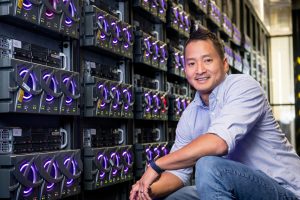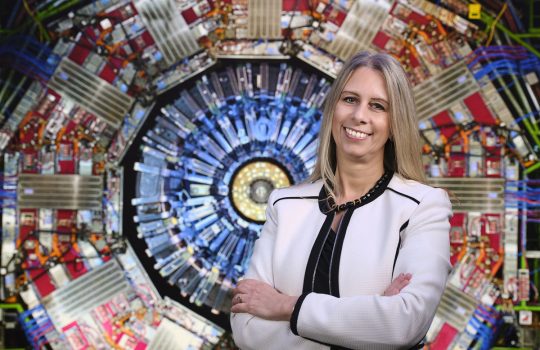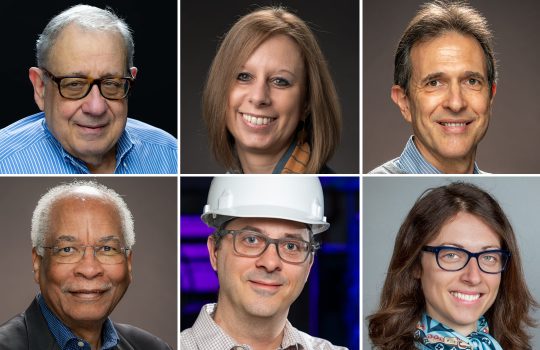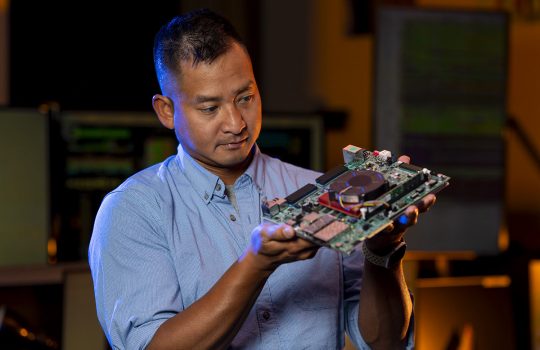
Fermilab scientist Nhan Tran is developing computer systems to cope with the increasing amounts of data that particle colliders produce. Photo: Reidar Hahn
The field of particle physics produces colossal amounts of data as it pushes the frontiers of human understanding. Fermilab scientist Nhan Tran is working to make sure researchers have the innovative techniques and technology they need to handle the data deluge and to select the details that are likely to reveal exciting new physics phenomena.
And now he has received a prestigious award to advance this work. The Department of Energy Early Career Research Award will provide Tran with $2.5 million over five years to lead efforts to apply artificial intelligence to push the frontiers of both physics and technology.
Tran will use a type of artificial intelligence called deep learning to expand the capabilities of particle collider research. Deep learning uses a complex artificial neural network, inspired by biological brains, to allow a computer to learn how to perform a complex task, such as identifying an object in a picture, without being explicitly programmed for that task. Each of the many layers or artificial neurons in an artificial neural network can modify the data before passing it on to another piece of the network. The program adjusts how these changes occur based on test information that is provided to it in order to configure itself for the desired task.
“As we get more and more data, computing is going to be a real issue,” Tran said. “Using new types of computing hardware with deep learning algorithms is a promising way to overcome this issue.”
Tran is applying his expertise to expand the impact of experiments at the Large Hadron Collider, a 17-mile-around particle collider at CERN in Switzerland, in two major ways. He will use the award funds to develop systems that will improve how computers handle the LHC data flood. He will also further develop a technique he pioneered that allows scientists to identify in the LHC data particles called Higgs bosons, whose discovery in 2012 led to a Nobel Prize.
At the LHC, beams of protons collide to produce other particles, including Higgs bosons, and these post-collision particles carry a wide range of momenta. Nhan is interested in using deep learning to identify Higgs bosons with high momentum and how they decay into other particles. Studying Higgs bosons under these new conditions opens the door to discovering new physics.
“Observing these specific events was considered to be impossible at hadron colliders,” said Fermilab senior scientist Anadi Canepa, head of the CMS Department in which Tran works. “And then Nhan and collaborators came up with this new technique, and he’s extracting much more than we thought we could from the data we collect.”
His work on the Higgs boson will be helped by the other thrust of his award-supported work: developing computer systems to cope with the increasing amounts of data that particle colliders produce. Instead of just improving generalized computing technologies, Tran’s plan is to develop systems that combine hardware that is specialized for efficiently performing specific types of computations, exceeding the capabilities of traditional computer technology to address those tasks.
“Nhan is a very clear thinker with a keen taste for where to focus his efforts,” said Fermilab scientist Gabriel Perdue, who leads artificial intelligence efforts at Fermilab. “He knows better than anyone that what you choose to work on is more important than any other decision you make, and his ability to figure out the most important problems and tackle them directly really sets him apart. He really understands the point of highest leverage for AI in high-energy physics and is making a huge difference right at that point.”
Tran was introduced to the world of advanced computer technology through his postdoctoral physics research on trigger systems, which select what collision data to keep from among hundreds of millions of particle collisions generated every second at the LHC. He and researchers in industry are now exploring the high-tech electronics that Tran worked on for opportunities to improve computers.
Tran plans to couple more efficient hardware developed by tech companies, such as Microsoft and Xilinx, with Fermilab’s existing computer infrastructure to meet future demands.
“People in the computer industry are always interested to hear about our problems, because we present them with very challenging data sets in terms of their complexity, their size and our own unique requirements,” Tran said. “We generally present them with problems that can push the boundaries of their own technology.”
Tran plans to use the award to purchase new computer hardware, to hire a postdoctoral researcher for the projects and to enable experts at Fermilab to determine how to apply novel computing systems on a large scale.
“Nhan is internationally recognized as an innovator who completes his ideas,” Canepa said. “If he has an idea, that idea then becomes a reality. He has demonstrated that in challenging situations, and every time, he succeeded. He also chooses the right ideas. He really sees what are the main challenges — what is pulling us back from extracting the most information out of our precious data — and he identifies what’s the most relevant and impactful improvement and goes after that.”
Tran says Fermilab is a great environment for his work. He appreciates the excellent postdoctoral researchers that come to the lab and the ability to just walk up or down a floor and consult with experts, especially about the computing topics that he is not formally trained in.
“It’s an honor to receive this award,” Tran said. “And it’s really exciting to explore new techniques in deep learning and push it as far as we can go, both on the physics side and the technical side.”
This work is supported by the Department of Energy Office of Science.



